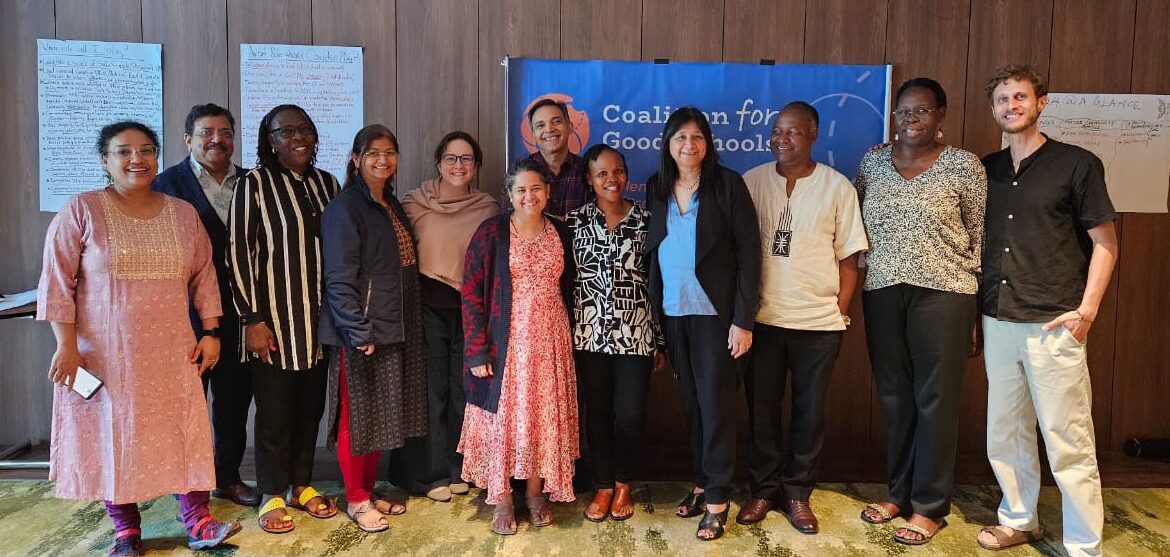This was the fourth annual retreat to review, reflect, recharge, and reaffirm our way forward, and the space afforded us opportunity to deliberate on how Global South practitioners can continue to lead this movement. It highlighted for each of us how far we have come, how far we still have to go, and the unique role that we play to build the field of VAC prevention in and through schools, by and for the Global South.
Key Takeaways from Group Discussion
Leadership for long-term behavioral change: We know that schools serve as foundational systems for engaging broader ecosystems (teachers, parents, communities) to address violence across the life course, and recognize VAC prevention in and through schools as foundational to ensure other interventions can be more successful. To lead, the Coalition must continue to push for systemic change. Our collective strength lies in persistence, and in the ground-level, practitioner-led expertise of our members in navigating these complexities.
Building a connected movement: Deeper and ongoing connection among organizations, activists, and donors is necessary to build a sustained movement. Partnerships – for knowledge generation, priority setting and advocacy – offer opportunities to address power imbalances in this work and make a statement about how this work should be done. Our assertiveness about equitable collaboration strengthens our collective leadership within the movement.
Knowledge Translation & Sharing: Translating global learnings into local action, strengthening evidence for scalable interventions, and fostering practice-based learning are among the highest demands from our networks of practitioners. Our work requires intentional spaces for shared learning, translating evidence into advocacy and action that resonates with diverse regional and local contexts.
Navigating political and funding shifts: Political transitions and competing funding priorities (e.g., prevention vs. response) require strategic, collective advocacy. Even when the foundations beneath us are shaking, we hold each other on firm ground, rooted in our staunch commitment to the sustainable impacts of safe and equal learning environments. Persistence is key to ensuring VAC prevention in and through schools remains central amid competing priorities and scrambling for resources.
Centering power, breaking silos: Addressing power imbalances—whether in schools, partnerships, or global advocacy spaces—requires Coalition-led efforts to amplify Global South perspectives, practitioner voices, and survivor/child leadership. South-led spaces must emerge to counter extractive norms without creating silos.
We are still a young coalition. From our first phase, where we were just establishing our shared identity and vision, to a second phase that built our infrastructure, strategy and regional momentum, now to our current phase focused on effectively achieving our collective outcomes, the Coalition remains an emerging opportunity to provide shared leadership at global and regional levels and cultivate a pipeline for leadership for the ever-growing field across the Global South.
Strengthened Communities of Practice
Our Latin America Hub reflected on how they developed a stronger sense of regional identity through production of the Sin miedo en la escuela country report series, fostering common language and connections while identifying gaps in engagement and capacity. While gaps in understanding and capacity were identified through this research, so too were opportunities to strengthen links between policy, evidence, and practice. Exploring regional advocacy opportunities and the role of networks like PAHO to mobilize action, and mapping progress on policy implementation were identified as priorities.
Our Asia Hub shared their journey of building shared ownership among Hub members, with plans for an in-person convening in 2025 to strengthen roles and cross-regional learning. Engagements emphasized the power of digital communications in increasingly online environments, as well as the need for an explicit intersectional approach to understanding violence in schools across a region that encompasses so much of the world. Ongoing stakeholder mapping for 2025 aims to identify engagement opportunities while empowering members to articulate their unique approaches to addressing violence and gender equality in schools. Notable journeys to scale in partners such as Breakthrough and Child Protection Network will be further unpacked and shared in the year ahead.
Our Africa Hub demonstrated organized, active membership with deepened roles, strong government engagement, and regular convenings that built momentum for prevention work in schools. There remained a focus on skill-building to lead regional prevention agendas, with opportunities for external expertise and proactive agenda-setting through pre- and post-Bogotá engagements and ongoing advocacy with the African Union. Strong government commitments in sub-Saharan Africa, coupled with advocacy through ACERWC, highlight receptivity for change. The recently completed regional evidence review and policy mapping exercise would be powerful tools for advocacy, regional learning and capacity strengthening for practitioners in the year to come.

